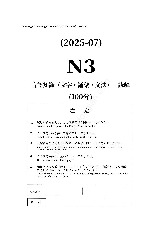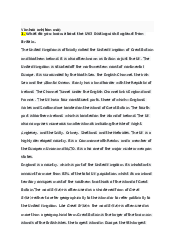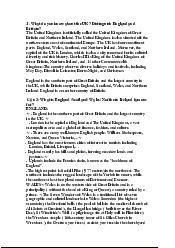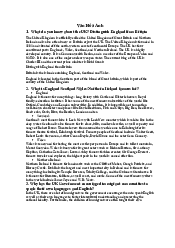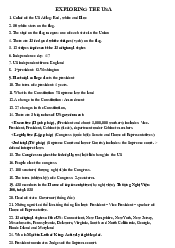









Preview text:
ĐỀ CƯƠNG VĂN HÓA ANH
1. What do you know about the UK?
United Kingdom, not Great Britain, was founded on 1 January 1801.United Kingdom is
an country belonging to the European continent that includes four separate countries on
the British isles: England, Northern Ireland, Scotland and Wales.The United Kingdom is
located primarily on two large islands in the Atlantic Ocean: the islands of Great Britain
and Ireland. Its population exceeds 63 million, with London, its capital, making up more
than 8 million of the population. surname number. Other major UK cities include
Manchester, Birmingham, Leeds, Glasgow, Portsmouth, Liverpool, Newcastle,
Nottingham, Sheffield, Bristol, Belfast, Leicester, and more. The official spoken language
is English and their currency is the British pound. Its political definition is that of a
parliamentary monarchy. Mary Elizabeth Truss is a United Kingdom politician and
current Prime Minister of the United Kingdom. King Charles III (born 14 November
1948) ascended the throne after the death of his mother Queen Elizabeth on 8 September
2022. The UK is one of the greatest countries in the world, playing an important and
central role in global politics and economy.Famous festival
Diwali In Leicester,Jorvik Viking Festival,Guy Fawkes Day,Sidmouth Folk
Festival,Boomtown.The United Kingdom's highest mountain is Ben Nevis.Loch Ness is
the largest fresh water lake .The longest river in the UK is the river Severn
Distingued England và British:
Britain is not the same as the UK
Probably the most common misconceptions about UK. The notion Great Britain or just
Britain it only comprises the England, Scotland, and Wales, leaving out the Northern
Ireland, which is also a part of the United Kingdom. Officially the country’s name is The
United Kingdom of Britain and Northern Ireland. Furthermore, there are some people
who still confound England and the United Kingdom; they refer to the later on stating the
first. This can sound offensive to a Scotish or a Wales citizen, so keep this in mind.
2. What is England/scotland/ northern Ireland/ wales famous for? Scotland
Stirling - a royal fortress city with a vibrant modern outlook - It was granted city status in
2002. Scotland's most famous lake is Loch Ness with the Nessie monster which
is said to live in deep water.Scotland is also famous for its clans, kilts, medieval castles,
as well as poetry and songs of Robert Bums. Theatre lovers from around the world come
to Edinburgh for its famous theatres festival, Edinburgh festival. Famous people of
Scotland include: Waiter Scott, Robert Louis , Stevenson,Arthur Conan Doyle, David
Hume, and the actor Sean Connery. Northern Ireland
For such a small country, Ireland is remarkably famous for many things. Among the
things Ireland is most known for are its culture, drinks, food, music and sport. From the
well known St. Patrick’s Day celebrations on March 17th, to the Irish Pubs playing
traditional Irish music in cities across the world, not to mention the pints of Guinness and
Irish Stew, the Irish have very successfully managed to share their culture and Irishness
with much of the planet. Shamrock is a young clover with 3 leaves, and it is one of the
symbols of Ireland since the 18th century.Legend says that Saint Patrick used the 3 leaves
of the shamrock as a metaphor for the doctrine of the Christian Holy Trinity.it also
famous for Leprechauns, Guinness, temple tar,Riverdance,Genious authors,.... wales
Wales is famous for having a dragon on its flag.Wales is famous for its unique and, to
outsiders, baffling language. Wales is home to countless pleasures. From roast lamb and
traditional beer to Caernarfon Castle and Anthony Hopkins, there is a rich heritage to
explore while visiting. Swallow Falls is one of the most famous waterfalls in Wales.Wales
is famous for its mountains, of which the highest one is called Mount Snowdon. Roast
lamb is considered by many to be the national dish of Wales. .Welsh rarebit,Welsh cakes
are also famous food in Wales.The country's landmarks are arguably what Wales is most
famous for as the area is rich in cultural and natural heritage such as Snowdonia National
Park ,Caernarfon Castle,... Fagans National Museum of History, Cardiff Principality
Stadium,,Mount Snowdon.... Wales is famous for its previous conflicts with the British
Royal Family, and to this day, the title "Prince of Wales" remains is a controversial issue. England?
ENGLAND is famous for many things - David Beckham, Fish and Chips, Big Ben, Red
Buses, black cabs, Oasis, Blur, the Beatles, London and tea.England is famous for its
long history.England is famous for its Royal Family.England is famous for its Castles and
Historic houses Windsor Castle is the oldest royal residence still in use.England is famous
for its educational institutes. It has some of the most famous universities of the world like
Oxford, Cambridge and London universities.England is famous for some of the world’s
greatest pop stars - the Beatles, the Rolling Stones, David Bowie, Queen, Phil Collins, the
Spice Girls and Oasis.William ShakespeareEngland is famous for William Shakespeare.
Hamlet,Othello, and Romeo and Juliet were written by him.England is famous for its
creams and butters and for its delicious cheeses: Stilton, Cheshire, double Gloucester, red
Leicester, and cheddar.England is famous for its strawberries.England is famous for its
pubs.England is famous for an ancient circle called Stonehenge.It is the most important
prehistoric monument in England.England is famous for for Big Ben.England is famous
for the legend of Robin Hood, Sherwood Forest and its notorious sheriff. CÁCH 2 ( NGẮN GỌN HƠN)
+) England is famous for its pub food, UNESCO World Heritage Sites such as
Stonehenge and the Lake District, and the British Royal Family. England is also known
for cities such as London, Liverpool, and Manchester, age-old traditions such as drinking
tea, and being the home of football.
+) Scotland is known for its cities Edinburgh and Glasgow, as well as its highlands,
mountains, and 30,000 lochs(especially Ness, Lomond and Katrine). Also, the Scottish
are famous for their accent, humor, and being a nation of redheads! Food-wise, perhaps
you’ve heard of the Scottish favorites: haggis, “tatties” and “neeps”.
+) Wales is famous for its stunning scenery, ancient history, and charming language.
Wales is known for Mount Snowdon, its tallest mountain, and the most castles per capita
in Europe. There are also plenty of famous Welsh men and women, including Roald
Dahl, Anthony Hopkins, and believe it or not, Jack Daniels.
+) Ireland is famous for its marvelous views, both of the land and sea. Often referred to
as the Emerald Isle, Ireland has vibrant cities tucked beside cozy bays and sheer cliffs.
Ireland is where snug pubs, pints of Guinness and shots of Irish Whiskey go hand-in-hand
with hearty Irish homestyle cooking. There’s also ancient and modern history and St. Patrick’s Day celebrations!
3. Why has the UK government encouraged immigrant communities to speak their
own languages and English?
Because immigrants follow the mosaic social system _> means cultural integration, those
who want to keep their national cultural identity - they have their own languages, there
are bilingual schools that teach the mother tongue - ways to preserve national identity and
equality. In addition, you must learn English because TA is the common language of the
UK and an international language. If immigrants cannot speak the native language, they
will have difficulty adapting to society. The longer it takes for them to adapt, the harder it
is for native speakers to accept them. If an immigrant in London cannot speak English, it
will be difficult for them to find a job. A lot of expats in the UK and London have their
own businesses. But they have to learn the native language to be able to connect with
their target audience. One of the most popular occupations in the UK for expats is
tutoring children. Foreigners can teach students at their home. But they will not be hired
by their parents if they are not fluent in English. They also won't be able to do their job
well if they can't speak the student's language.
4. Why is standard with an RP accent the usual model for people learning British
English as a foreign language? what justification can you find in this practice?
RP (Received Pronunciation) is the accent traditionally regarded as the standard and most
prestigious form of spoken British English. For example, it is the pronunciation used in
English dictionaries and the pronunciation taught to foreigners in English books
published by Oxford, Cambridge and other major British publishers. It is the Southern
English accent. It is spoken by people who live from Bristol to East End of London.
Moreover, it has standard pronunciation and correct grammar so English speaker (and
those learning English ) are more likely to be understood than any other English language accent.
Example: “Have you ever been to London?” //hæv ju ˈevə bi n tə ː lˈ ndən// ʌ
“to” is normally pronounced /tə/ before a consonant and /tu/ before a vowel.
5. Give your comment on the British Parliament?
The UK parliament is one of the oldest representative assemblies in the world, with its
origins in the 13th century. During the 14th century two distinct Houses of parliament
began to emerge, with the Commons sitting apart from the Upper House from 1341. It
was also accepted that there should be no taxation without parliamentary consent, which
remains a fundamental principle.There are three parts of Parliament- the King or the
Queen, the Prime Minister, the House of Commons… These has a variety of Functions
such as passing legislation, providing a means to conduct government work, scrutinizing
government policy and management, including spending proposals to debate issues main
topic of the day .The main differences between the House of Commons and the House of
Lords are how the members get their seats, who has the final say in the billing process,
and the ability to dismiss the Executive. These parts have a close relationship, and
operate under the constitutional monarchy system.
6. Why does the British Prime Minister continue to “ advise” and resquest” the King
queen ,when everybody knows that he or she really telling the mornach? What to do?
The Prime Minister, along with Parliament, is a good thing when it comes to the British
Monarchy. Let's be pragmatic. Not every heir to the throne is born with the intellectual
ability to grasp the intricacies of government. The Queen never attended university and
was educated at home. She was taught important aspects that a monarch should know, but
not in the straight academic way most of the prime ministers of the time. The Queen is
perfect for the role of the Monarch but is not supposed to be an intellectual. Her
passionate hobby seems to be horses. She is patient with even temperament and believes
that God has appointed her to be Queen.
7. What are the oustanding features of the English education system ?
About 94% of pupils in the UK receive free education paid for from public funds, while
6% attend independent free-paying school.
In England, state school are classified into three broad categories: community school are
mainly school that were traditionally owned and funded by Local Educationm
Authorities(LEAs). Foundation schools include many of the former grant-maintained
schools. Voluntary schools are divided into controlled and aided, of which many are
connected to a particular religious faith. LEAs are responsible for emloying staff and for
admission arrangements in community and voluntary controlled schools. The school
governing body performs this role in foundation and voluntary aided schools. School in
all the categorieshave a lot in common. They work in partnership with other school and
the LEAs and they receive funding from LEA and they have to deliver the national
cirriculum. Each category has its own characteristics.
8. Give your comment on the british education system( kinds of schools, schools
levels, curriculum, qualification, management,etc)?
In many ways, the structures and systems of education in the UK are similar to education
systems in other countries, notably other countries in Europe. The UK education system
is worldwide reputed for its high quality and standards. About 94% of pupil of the Uk
receive free education paid for from public funds while 6% attend independent free- paying schools.
+) In general, the UK education system has 5 stages: early years, primary education,
secondary education, futher education and higher education.Primary and secondary
education are compulsory. After the age of 16, education is optional. Once a student
finishes secondary education, he has the option to extend into futher education to take
their national vocational qualifications( at vocational school). Students planning to go to
college or university must complete A levels. The UK has a vast variety of higher
education opportunities to offer students with university, offering various degree programs.
+) Ciriculum: all state school must provide religious education but parents have the right
to withdraw their children from these classes. Sex and relationship education including
education about HIVS and other sexually transmitted diseases, are compulsory in UK secondary schools.
+) Qualification: examinations in England, Wales and Northern Irelandare typically taken at the following ages:
-16: General Certificate of Secondary Education (GCSE)
-17: General Certificate of Education Advanced Subsidiary(AS level) which is equivalent to 50% of an A level
-18: General Certificate of Education Advanced (A level)
+) Management: Most universities and colleges are legally independent institutions with
independent governing bodies that include nominations from the local community and business.
9. What do the three branches of the UK government do?
In the United Kingdom, the three branches of government are the legislature, the
executive, and the judiciary. Parliament is the British legislature. It comprises two houses
- the House of Lords and the House of Commons. The responsibility of the legislature is
making laws. The executive is the central government, made up of the Prime Minister
and their cabinet. The executive governs the UK, from initiating and implementing
legislation to running of local and national services. Finally, the judiciary not only
determines common law and interprets legislation but also supports and protects the rights of citizens.
Theoretically, The Queen is head of the executive and plays an integral part in the
legislature. She also heads the judiciary and is both the commander-in-chief of all the
Armed Forces of the Crown and the “supreme governor” of the established Church of England.
10. How many types of family patterns are there in the UK? Which is your favourite? Why?
There are 7 types of family patterns in the UK: • Nuclear family • Extended family • Single family • Grandparent-grandchild family • Childless family • Blended family • Same-sex family
I like a nuclear family. A nuclear family includes mother, father, 1 or 2 children. This type
of family is usually stable financially because parents just provide for themself and their
children. Children are provided with health and education properly. Moreover, nuclear
family plays an important role in the development of personality of individuals. Children
are more close to the parents and can have more free and frank discussion about their
problems with parents which helps for the better development of their personality. In
nuclear families, the condition of woman is better than joint families. She gets enough
time to look after her children. She also gets time to plan and manage her house
according to her own idea. There is no interference of elders. Her husband can also
devote more attention to the wife in nuclear family.Peace and harmony are very much
essential for a pleasant family life. In nuclear families there is no misunderstanding and
they enjoy a harmonious atmosphere by living together.
11. Explain the functions of the House of Commons
11. Explain the functions of the House of Commons
The House of Commons has four main functions within parliament. These are:
Passing legislation:The House of Commons plays a vital role in the billing
process. This is the name given to the creation of new laws. Proposed legislation,
or bills, are given to parliament to consider and debate. Working alongside the
House of Lords, the other House of Parliament, the House of Commons debates
and votes upon bills. Most bills start in the House of Commons.
Parliamentary Scrutiny: The House of Commons, alongside the House of Lords, is
responsible for holding the government to account, by scrutinising their actions to
ensure that they are doing their job properly and not abusing their power.
- Providing Ministers for the Executive: Alongside sitting in the House of Commons
a select few MPs are also selected to be ministers in Cabinet, also known as Secretaries of State.
Representation: Every MP in the House of Commons is elected by and represents
a constituency. They have the duty to prioritise their constituency's needs within
the House. To do this they make sure that any local issues are held into
consideration when discussing matters in the House of Commons. Additionally, if
their constituency has concerns on matters of the executive then the constituency's
MP can raise a question to the executive.
12. In what ways are British pubs different from typical cafe’s and bars in your country?
Some differences features between British pubs and typical bars in Vietnam:
Opening time: In the UK, the licensing laws allows pubs to open from 11:00 to
23:00. serving alcohol after 23:00 meant that a licensing extension had to exist—
either permanent, or by special application from the licensee concerned for a
particular occasion. Whereas, most bars in Vietnamese can open all day without being interfered by law.
In the UK, the minimum age at which people are legally allowed to purchase
alcohol is 18. Adults purchasing alcohol on behalf of a person under 18 in a pub or
from an off-licence are potentially liable to prosecution along with the vendor.
In the UK, there are family pubs welcome people with children and have facilities
for them. Avoid using rough language in a family pub.
You don’t normally tip bar staff in the UK. If you want to say thanks, then offer to
buy them a drink. They can then choose to accept the drink or take the value of the drink in the form of a tip. Cách trl 2 British pubs Vietnam cafes and bars Open at 11a.m and close at all day 11p.m
Children are not allowed inside Children are allowed to get a pub if the pub has no inside children’s certificate. Have no waiter Have waiters Nearly owned by brewery Nearly owned by individual Old style Modern style Not giving tips Giving tips
13. Do you think that the British welfare state is successful in giving help to everyone who need it?
Yes. As a developed country, the UK succeeded on applying welfare state to giving
help to people who need help. The British welfare state is deducted from the personal
income tax which the wage employees have to pay every year. The government use
this money to support to the unemployed, pregnant women, and children. With a
developed economy, the UK is reponsible for maintaining the quality of life in general
and their welfare state plays an important role in this. The UK government built a
logical welfare system with proper information and management items.This helps
welfare policies is implemented easily and effectively.
14. What are the function of the UK Press? What are the national newspapers like?
The press plays an important and sensitive role. According to theory, the press has seven
roles or duties, including: The Political function with one goal is to help people form their
own political decisions. A second goal is to prevent abuses of power or wrongdoing by
government officials. The Economic function is the press provides information about
products, goods & services, and businesses. The Sentry function is reporters work to keep
the public informed of current and upcoming problems. The Record-Keeping function is
Journalists provide a record of what happens every day on the local, state, national and
international levels. The Entertainment function with the goal is to provide a diversion
from the seriousness of the news. The Social function is Journalists give people things to
discuss in social situations. The press creates a community where people can share news
back and forth. The Marketplace function is the press is regarded as the marketplace of
ideas. Papers are a place to voice concerns or present solutions and to review decisions or options.
Some of the national newspapers in the United Kingdom are: The Sunday Times, The
Times, and The Daily Telegraph,Daily Mail Daily Mirror..
15. In your opinion, what bank holiday is the most popular with British people?
Describe it in detail. It is similar to a centain holiday or festival in your country?
In my opinion, New Year’s Day is the most popular bank holiday with British people.
December 31 is New Year's Eve. In the evening, many English people have parties in
their homes. Others celebrate in pubs or clubs with their friends and families, or attend
outdoor gatherings and firework displays.
Just before midnight on New Year's Eve, people hold hands and sing a traditional song
called "Auld Lang Syne". They count the seconds down to the new year and when the
clock strikes midnight, they hug and kiss and wish each other a Happy New Year!
Sometimes people set off fireworks as the new year begins. People often drink a toast to
the coming year with a fizzy alcoholic drink called champagne.
New Year's Day is celebrated on January 1. Everyone is off on this day. Most shops and
businesses close for the day. New Year's Day is a holiday for nearly everyone in the UK.
Very few buses and trains run on New Year's Day. Most people stay at home and relax with their families.
This day exists in Vietnam as well, however it is only an extra day off. The Lunar New
Year is a significant holiday for the Vietnamese people. This is a special occasion for
Vietnamese to gather for a union. It is a day of harmony between heaven and earth, man
and god, returning to the roots, bringing fortune, starting a new year, lucky day, day of
renewal, optimism and hope , day for love, harmony. Vietnamese often pack Chung cake,
display the five-fruit tray, clean the house, collect graves, visit relatives, participate in traditional sports activities. GOOD LUCK DO PHUONG THAO
